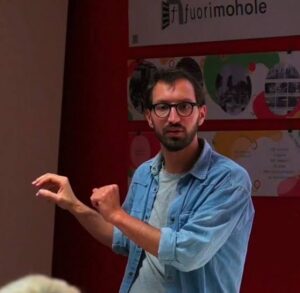Biography of Alessandro De Rosa: Humble Beginnings and Formative Years
Who is Alessandro De Rosa?
Let’s talk about Biography of Alessandro De Rosa: Alessandro De Rosa was born in Milan in 1985, and from early on music and composition were more than a pastime, they were the trajectory of his life. His story is one of early promise, mentorship by a master, reinvention, and the creation of a truly contemporary musical voice deeply rooted in tradition. De Rosa’s path would lead him into the world of cinematic & concert music, it would place him beside one of the greatest composers of the 20th century, and it would see him emerge not only as a composer but also as an author, educator and cultural interlocutor.
Biography of Alessandro De Rosa
Alessandro De Rosa Humble Beginnings and Formative Years
Growing up in Milan, De Rosa was immersed in an environment where art, culture and music were accessible but also required commitment. The young Alessandro displayed an appetite not only for playing music but for understanding how composition worked—what drives a melody, how harmony plays in time, and how music converses with life. At 19, while still in his formative years, he took a leap of faith and approached the legendary composer Ennio Morricone. That bold move was the beginning of both a personal relationship and a professional journey that would shape De Rosa’s life. According to sources, Morricone looked at the young man’s letter and CD of original work and told him: “You must study composition. You cannot do otherwise.”
Under Morricone’s encouragement, De Rosa studied more seriously. His formal education took him to study with composer Boris Porena in Italy, and subsequently to the Netherlands, where he graduated in composition at the Royal Conservatory of The Hague.

The Mentor, The Master, The Meeting
The relationship between De Rosa and Morricone is central to understanding Alessandro’s career—not as a shadow, but as a launching point. De Rosa became Morricone’s biographer and interlocutor, producing the book Ennio Morricone – Inseguendo quel suono. La mia musica, la mia vita. Conversazioni con Alessandro De Rosa, which is structured as a dialogue between Maestro and admirer.
In a 2022 interview, De Rosa reflected on how he delivered a CD and letter to Morricone at the age of 19, leading to an eleven-year professional and human relationship.
That access allowed De Rosa to gain an intimate view of Morricone’s creative process, his compositional mindset, his view of music and life. This viewpoint would feed De Rosa’s own growth as a composer and cultural thinker.
Career: Composition, Collaboration, Creation
From his early days as an ambitious student, De Rosa moved into professional composition and arrangement with impressive scope. He collaborated with a number of high-profile artists. Among them is the British singer Jon Anderson (of the band Yes) with whom De Rosa worked as composer/arranger.
De Rosa’s driving conviction is that composition must connect with human experience, whether through media, concert music or applied music (music for film, agency, advertising). His concert works illustrate this blend of seriousness and ambition: for instance Gravità Ritrovata for orchestra was commissioned by the Residentie Orkest on its 110th anniversary in 2014. The opera Trashmedy premiered at the 63rd edition of the Venice Biennale Musica in 2019, further asserting him in the contemporary music world.
In addition to his composing and arranging, De Rosa took on managerial and curatorial roles: he has worked as Head of A&R and Talent Manager at Pastelle Music and in recent times became the manager of Italian singer-songwriter Irene Grandi. He also operates as a speaker and author for cultural television and radio channels in Italy and Switzerland (RAI, RSI).
The Artistic Signature and Approach
What sets Alessandro De Rosa apart is his ability to move comfortably between worlds: from applied music (commercial, media) to the concert hall, from classic composition form to contemporary sonic experimentation. His training under Porena and at The Hague gave him a solid technical foundation, while his relationship with Morricone gave him access to the mindset of one of the greatest film composers of our era—how a motif works, how to conjure an image with sound, how structure serves emotion.
His works reflect a synthesis of tradition and innovation—he does not spurn classical form, but he uses it with purpose. His collaborations with popular artists and his work for media show his adaptability. The opera Trashmedy, for example, is not simply an academic exercise—it was composed for a major international festival.
His authorship of the Morricone book shows another dimension: he is not only a creator of music but also a storyteller of music—someone who cares about how music is communicated, remembered and reflected upon.
Alessandro De Rosa Key Milestones and Recognition
Among the many milestones in De Rosa’s career are: his graduation and early compositional successes; the commissioning of concert music by major institutions; his role in writing the Morricone biography; participation in the documentary Ennio (2022) by Giuseppe Tornatore.
His book about Morricone has been translated into numerous languages and re-issued multiple times, underlining the international appreciation of his work.
Alessandro De Rosa Personal Philosophy and Vision
Although information about De Rosa’s personal life is less public than his professional work, the tone of his interviews and writings suggests a composer deeply thoughtful about the role of music. He speaks of music as a dialogue, an encounter between sound and vision, past and future. The fact that he uses media, concert traditions and education channels indicates his belief in the broader social and cultural role of music—not just as entertainment but as reflection, as meaning.
Alessandro De Rosa Looking Forward: What Lies Ahead
As of the early 2020s, Alessandro De Rosa continues his freelance composing, arranging, authoring and speaking work. The future likely holds new concert pieces, perhaps further projects in cinema or large-scale music for media, as well as continuing his role as a cultural interlocutor—bridging the classical/composed world with popular and media formats. Given his past trajectory, one can expect that his music will continue to grow in ambition and reach.

Frequently Asked Questions about Alessandro De Rosa
Who is Alessandro De Rosa?
Alessandro De Rosa is an Italian composer, arranger, producer, author and speaker, born in Milan in 1985. He is known for his concert works, arrangements for media, collaborations with artists, and his role as the official biographer of Ennio Morricone.
What are some of Alessandro De Rosa’s notable works?
Among his notable works are the orchestral piece Gravità Ritrovata (commissioned by the Residentie Orkest), the opera Trashmedy premiered at the Venice Biennale Musica in 2019, and the book Ennio Morricone – Inseguendo quel suono. La mia musica, la mia vita. Conversazioni con Alessandro De Rosa.
What is his relationship with Ennio Morricone?
De Rosa approached Morricone as a young composer and over more than a decade became his confidant, biographer and collaborator. Together they created Morricone’s official autobiography-in-conversations, and De Rosa contributed to the 2022 documentary Ennio by Giuseppe Tornatore.
What kind of musical training did he undergo?
Alessandro De Rosa studied composition, first in Italy under Boris Porena, then achieved his diploma at the Royal Conservatory of The Hague in the Netherlands. His training allowed him to work across genres and media.
What are his current roles and what can we expect from him in the future?
In addition to composing and producing music, De Rosa works as an author, speaker and cultural commentator (for RAI and RSI), and as a talent manager in the music industry. Going forward, he is expected to release further concert works, media compositions, and perhaps more cross-media musical projects bridging classical and contemporary.
Conclusion
Alessandro De Rosa’s career is a tapestry of ambition, mastery and meaning. From a young Milanese composer daring to approach a musical legend, to a fully-fledged figure in his own right—composer, biographer, cultural connector—he exemplifies the modern artist who refuses to be boxed. His music moves between concert halls, film studios, media agencies and global networks of culture. His authorship of the work on Ennio Morricone reveals both a reverence for the past and a desire to carry forward its legacy into new forms.
In a time when music often seems ephemeral, De Rosa reminds us of its enduring power: to shape memory, to accompany stories, to bridge generations. His journey speaks of work, of mentorship, of daring to go beyond what seems possible, and of being open to the roles music can play, not just for the listener, but for society.
As his output continues to evolve, Alessandro De Rosa remains a musician rooted in tradition but looking ahead, a creator shaping sound and meaning for the age. For anyone interested in the intersection of composition, culture and media, his story is one to follow.
